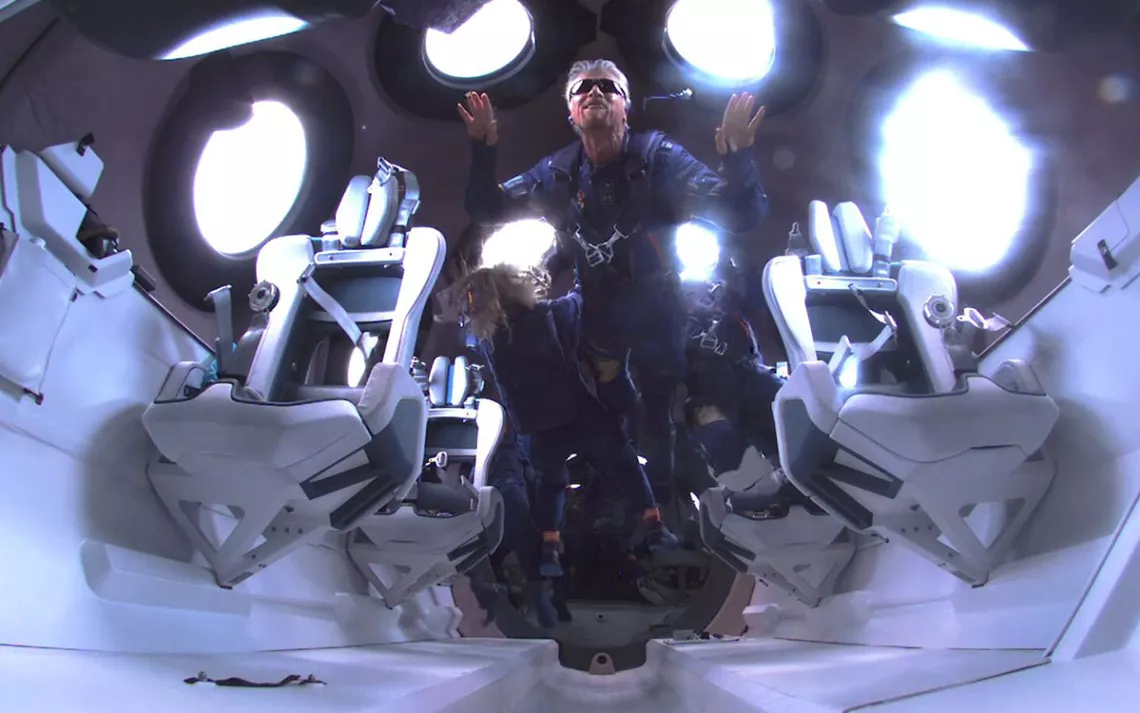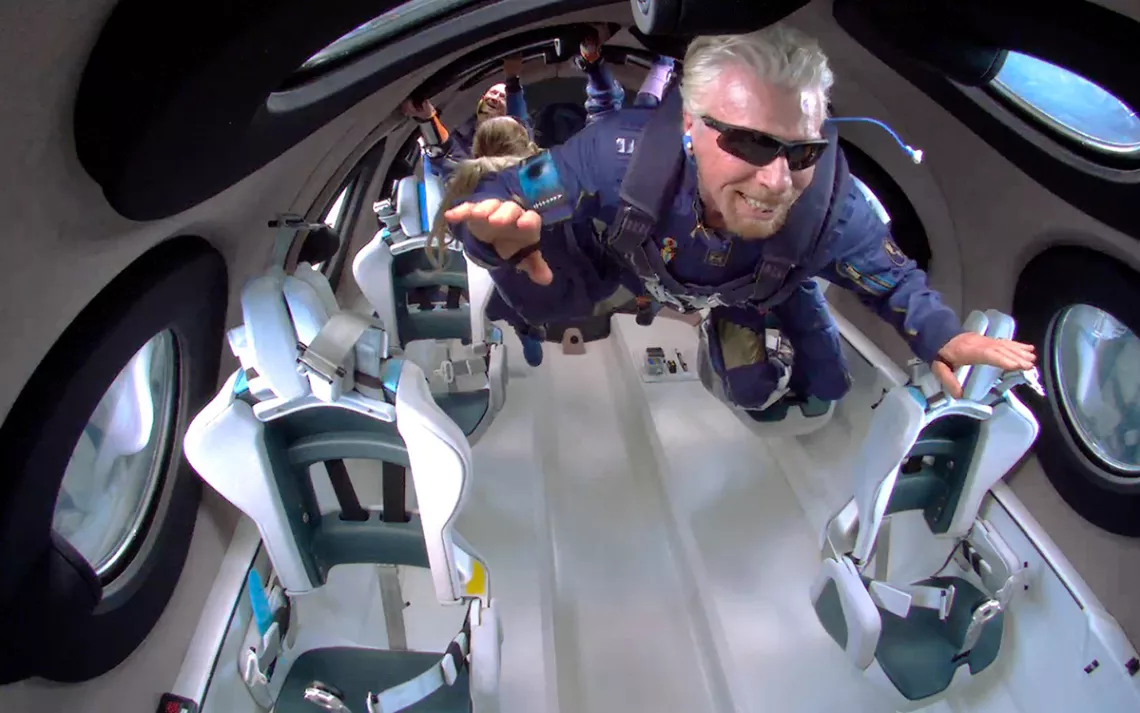Billionaires Do Not Need to Go to Space
Our whole planet is a spaceship, darn it
The opinions expressed here are solely those of the writer and do not necessarily reflect the official position of the Sierra Club.
Last week, billionaire Richard Branson soared high above the earth in a rocket, to the edge of space. The flight marked the launch of the commercial space travel that Branson’s company Virgin Galactic plans to begin offering next year, setting off what he calls “the dawn of a new space age.” On Virgin Galactic’s global livestream of Branson’s flight, red-hot streaks of rocket propellant blasted from the engines against the blue sky over New Mexico. The mood was one of levity. Like the Cold War moon landing, as a public spectacle it brimmed with hopeful possibility and served as a demonstration of what we are capable of when we direct our resources and imagination toward a goal. A montage advertised the Virgin Group (Galactic is just one of some 400 companies that Branson owns), and a voiceover intoned, “If we can do this, imagine what else we can do.”
Two days earlier, Death Valley reached 130 degrees Fahrenheit, the hottest temperature on Earth ever recorded. More than 31 million American people who were not floating giddily in space were under heat advisories, in the third major heat wave of the summer. The associate director of the Environmental Change Institute at the University of Oxford, Friederike Otto, told The Guardian, “This is by far the largest jump [in temperature] in the record I have ever seen,” a statement that echoed Neil Armstrong’s “one giant leap for mankind.” If we were seeing the dawn of a new space age, we were also seeing the dawn of a much hotter Earth—and traveling in rockets is arguably the most carbon-spewing thing an individual can do.

As climate change accelerates on the planet, the world’s wealthiest people seem to be seeking diversions of entertainment as far from the earth as they can get, beyond the carbon-laden atmosphere, and into the few minutes of microgravity that such space flights will afford. Jeff Bezos, the richest person in the world, will also escape Earth’s atmosphere for a few moments next week, if all goes as planned, in a rocket made by his own nascent space-travel company Blue Origin. And Elon Musk’s company SpaceX promises to revolutionize space tourism, “with the ultimate goal of enabling people to live on other planets,” according to its website.
All three companies say they have a goal of making space accessible to more people. Tickets for a rocket seat currently range from $250,000 to $28 million. Meanwhile, many continue to lack access here on Earth to clean air and water, and nine out of 10 people on the planet don’t fly in an airplane in a given year.
While the rocket that transports Bezos to space next week will fill with oxygen so that he can breathe, scientists will be making sense of the shocking new findings that the rainforest for which Bezos’s company is named is now a carbon source rather than a carbon sink, producing more carbon than oxygen as more of the forest burns in wildfires and illegal clearings.
If we can do this, imagine what else we can do. Not everyone has the privilege of turning their wildest imagination into reality, but I did imagine what else billionaires like Branson, Bezos, and Musk could do. With the money, vision, and power they are directing toward enabling a small fraction of the world’s wealthiest people to leave the earth, how could they instead ensure that the rest of us can keep living on it?
If it seems ludicrous to look to the world’s wealthiest to change the course of climate policy, government regulations, and carbon consumption, it’s important to remember that they have already done just that. SpaceX has spent at least $17.5 million lobbying the federal government over the past 10 years, and Blue Origin has spent $7 million, while Virgin Galactic tossed a quarter of a million at Washington politicians just last year—all to clear the way for their space tourism industry.
When the Unity rocket reached the edge of space, livestream host Veronica McGowan announced triumphantly, “Space is Virgin territory.” One can see the temptation to look upward to new territory, the clean slate of space uncorrupted, a place not yet in crisis due to the unwise use of resources. Like the colonizing mentality that was driven by the rhetoric of a virgin wilderness—whose beauty seemed to invite rapacious extraction—the space tourism industry is rife with frontier language, and headlines were quick to deem Branson a pioneer. The hyper-individualistic mythos of the American West that churned images of the lone cowboy riding off into the sunset now imbues the story of a man on a rocket ship riding out to the open frontier of space. The cowboy left matters of home and hearth behind, as the space traveler escapes, for a few brief and weightless moments, the home planet. If the name Unity was meant to inspire notions of our solidarity as a species, it only highlighted how those who will experience the worst effects of the fossil-fuel habits of the rich are all the rest of us.
TikTok star, Instagram influencer, and commercial spaceflight professional Kellie Gerardi gushed on the Virgin livestream that, “Not even the sky is a limit.” For almost every person who calls the earth home, though, and who won’t ever leave the atmosphere, the sky is exactly the limit. Its carbon molecules affect temperature, air currents, rainfall, sea levels, and the air we can breathe. Even a billionaire can’t survive above it for long. Branson flew over southern New Mexico, where Virgin’s Spaceport America is located, and where residents have been looking to the sky for rain as their water reservoirs sink lower and lower in an unprecedented drought. Gerardi beamed, saying she was happy that her three-year-old daughter will grow up knowing that she can fly to space. Tickets to the Virgin flight on which Gerardi will travel have sold for $600,000.
Astronaut Chris Hadfield, another of the livestream hosts, said, “The world is generously beautiful.” When you see it from space, he said, “You see it in a whole new way. There’s a transformation when you see Earth from above.” The view of Earth from space, captured by the Apollo 17 crew in a photograph now known as “The Blue Marble” gave a perspective of our fragile Earth, its oceans and atmosphere, and helped to launch a modern environmental movement that framed all of humanity together in a shared and common fate. Yet, most of the world’s 7 billion of us will only ever see the planet from here, and the generous beauty from this point of view has always offered profound transformation.
Will the very small fraction of extremely wealthy humans who escape Earth’s atmosphere be able to see it from up there as the precious blue home that it is, in need of a redirection of their resources? Will they bring back a different story about their relationship to the planet? Or will they just have one more “experience of a lifetime”—Branson’s words for his journey—that will accelerate the crisis that defines all of our lifetimes, and those of our grandchildren?
The opportunity to escape Earth’s gravity for the weightlessness of space makes many people starry-eyed. But while Musk, Bezos, and Branson are building spaceships, we already live on one. It's perfectly designed for life in space, safely transporting all of its inhabitants at hurtling speeds through the universe, a state-of-the-art ship from which we can see the stars every night for free, and freely breathe the atmosphere. The money and power spent trying to leave it could be used to take care of this ship we’ve been given, ensuring that all of us have a ticket to the experience of a lifetime.
 The Magazine of The Sierra Club
The Magazine of The Sierra Club




